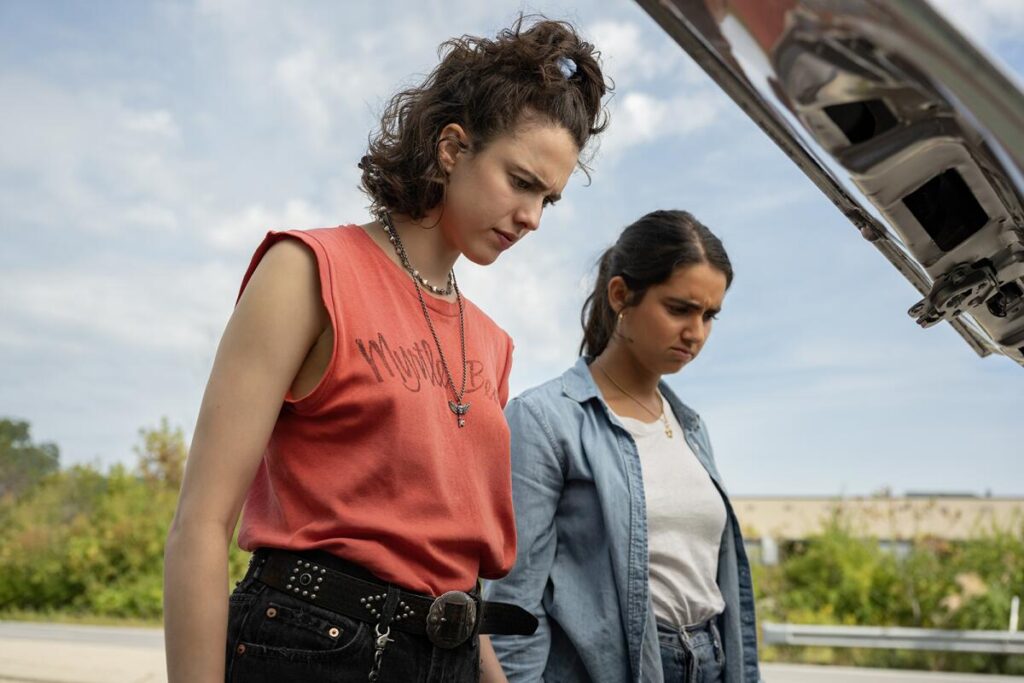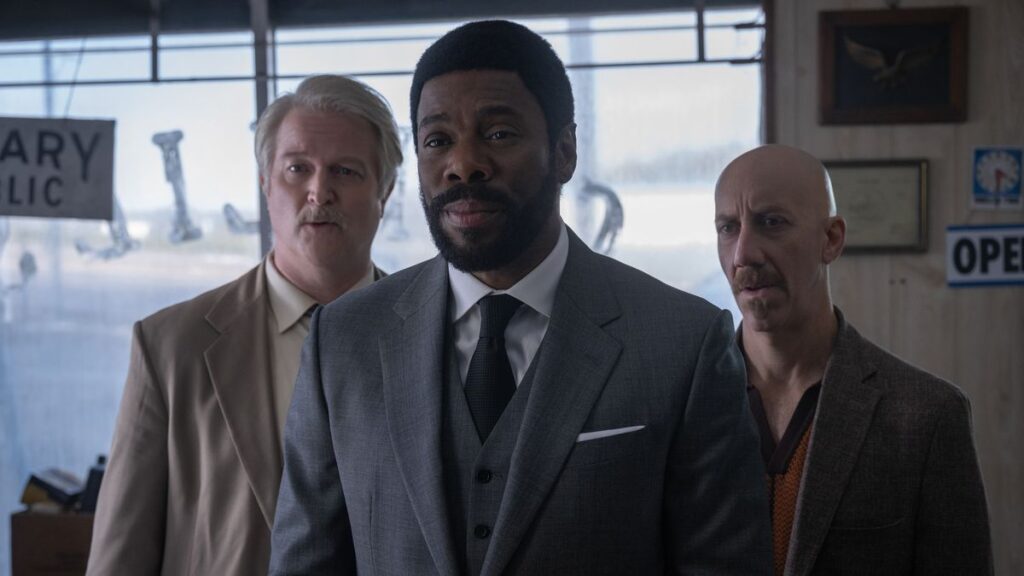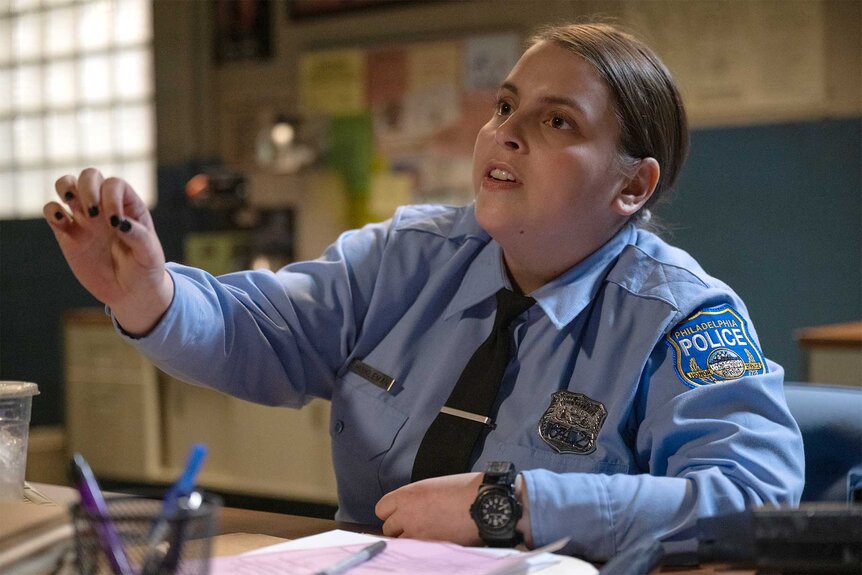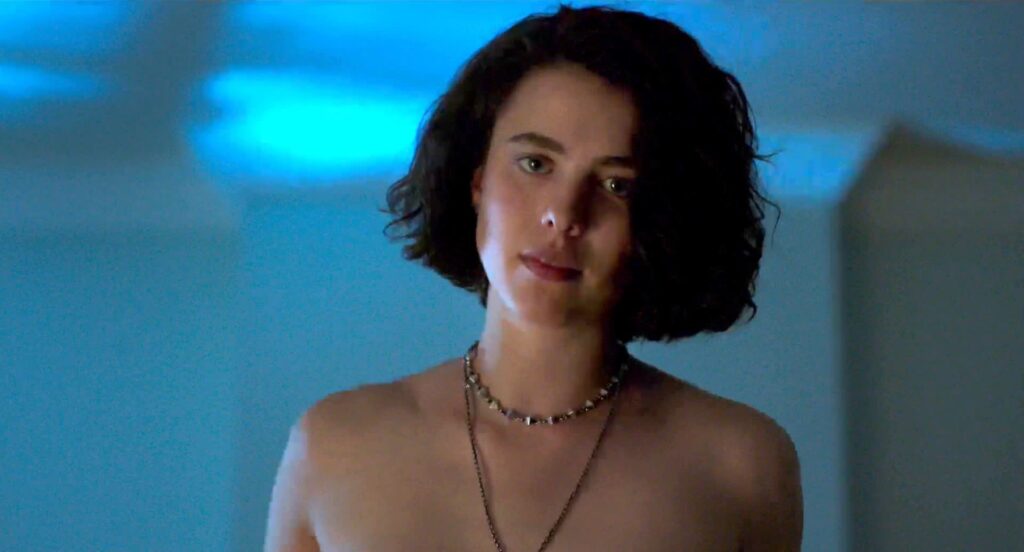
One of the most deliciously perverse surprises of the Coen Brothers’ Burn After Reading occurs more than an hour into the movie, when the ominous device George Clooney has spent so much time tinkering with is revealed to be an elaborate sex toy. Drive-Away Dolls, Ethan Coen’s first venture (ignoring his little-seen documentary on Jerry Lee Lewis) without his sibling Joel, exhibits rather less patience in bombarding viewers with adult paraphernalia; within its first 15 minutes, contraband is inserted into various orifices, while a divorcing couple fights over ownership of a rubber phallus that protrudes invitingly from their living room wall. Sure, this movie may have half the number of usual Coens, but it has way more dildos.
This isn’t to suggest that Drive-Away Dolls is immature or unsophisticated. Setting aside that sex jokes can be very funny when delivered well, Coen’s solo debut is deceptively ambitious, cramming plenty of plot, action, and ideas into its fleet 84 minutes. Yet it lacks the elegant deftness of that Burn After Reading scene, which embodied the brothers’ nimble fusion of polished technique and puerile humor.

Weighing Drive-Away Dolls against the oeuvre of cinema’s most decorated sibling duo is both ill-advised and inescapable. How am I to resist when it features a precious briefcase that recalls a plot point of The Big Lebowski, or a pair of mismatched goons who seem like an exaggerated version of Steve Buscemi and Peter Stormare’s oil-and-water partnership in Fargo, or a head-sized box similar to the one John Turturro clutched in Barton Fink? Certainly Ethan lacks the painterly eye that Joel brought to his Tragedy of Macbeth. Drive-Away Dolls is hardly a bad-looking movie, with its streaks of neon and portentous close-ups, but it’s visually undistinguished, and its most annoying tic—hallucinogenic interstitial transitions with random blurs of color—will have you crying, “O brother, where art thou?”
But again, such comparisons are unfair, and Drive-Away Dolls is interesting enough to be judged on its own terms. Coen, who wrote the screenplay with his wife, Tricia Cooke, has mashed together genres in ways that are engaging as well as ungainly. The movie is by turns (really all at once) a road picture, a mob thriller, a workplace sitcom, and a surprisingly touching love story. If the pieces don’t fit together all that neatly, their friction nonetheless produces sparks of entertainment.

The happily ridiculous plot somehow hybridizes strains of Booksmart, Red Rock West, and Dumb and Dumber. In the opening scene, the camera glides into a Philadelphia diner before alighting on a fidgety man (Pedro Pascal) clinging to an attaché case that may as well have “MacGuffin” etched into its metal. Before long, someone is plunging a corkscrew into one side of his neck and a ballpoint pen into the other, in a display of comic violence meant to advertise the film’s outlandish sensibility. Less bloody but equally noisy is the apartment across town, where Jamie (a fabulous Margaret Qualley) is having enthusiastic sex while simultaneously fielding a phone call from Marian (Geraldine Viswanathan), an office drone who’s deflecting attention from a male colleague with rather less gusto.
Inevitably, the script contorts and contrives such that these two disparate worlds—the noirish universe of mayhem and murder, and the more prosaic mundanity of sex and friendship and loneliness—intersect, placing Jamie and Marian as unwitting cogs in a hectic conspiracy that winds its way down the eastern seaboard. The machinations of this convergence—involving a dimwitted car salesman (Bill Camp), a smooth-talking middleman (Colman Domingo), and a lustful college soccer team—are not quite as satisfying as they might have been. Drive-Away Dolls has a number of funny lines and some enjoyably outsized characters—Joey Slotnick earns some laughs as a talkative assassin opposite a burly grunt (C.J. Wilson), and it’s always nice to see Beanie Feldstein—but its comic rhythms can feel off, while its heightened tone demands a level of narrative cleverness and suspense that it fails to achieve.

Yet what makes the movie work—the proverbial rug that ties the film together—is the relationship between Jamie and Marian. When we first meet them, they are by all appearances temperamental opposites; where Jamie is licentious, crude, and free-spirited, Marian is virginal, bookish, and uptight. (During a sojourn in Delaware, Jamie prowls for casual sex while Marian stays in the motel reading Henry James.) The main emotional arc of Drive-Away Dolls lies not so much in these two women reciprocally giving ground and meeting in the middle, but in Jamie helping Marian acquire a measure of confidence, even as she reveals her own hidden depths that have been there all along.
Hollywood has gradually chipped away at the specter of American Puritanism, but cinema still tends to view sexually assertive women with skepticism, if not outright judgment. Drive-Away Dolls initially appears to lean into that stigma only to eagerly demolish it. Sure, Jamie is unfaithful to her girlfriend, and she parades her body with a poise that the squeamish might call brazen. Yet she is also smart, decisive, and loyal, and we discover that these qualities aren’t contradictory to her appetites but concordant with them. She embraces life, and her desire for Marian to do the same—to experience similar pleasure, be it carnal or existential—is born of genuine affection, lending their burgeoning romance a powerful sizzle that’s both horny and wholesome.

Drive-Away Dolls may be aggressively silly, but the actors commit to their roles sincerely (as distinct from seriously). Viswanathan at first plays Marian as so buttoned-up, her blouse seems to fuse with her skin; she takes care not to overplay the wallflower’s emergence, gently nudging her from timid to assured. As for Qualley, there is nothing remotely gentle about her performance; from the moment you hear her gargling dialogue in a vaguely Texan accent (and even before that, when she’s shrieking in bed), it’s clear that she’s having a ball. Yet the bigness is perfectly scaled to the character, even as it’s undergirded by a stealthy layer of nuance. Jamie is committed to finding a state of perpetual delight, which is why it’s so delightful being around her.
In fact, I’m not sure that Drive-Away Dolls is worthy of such a splendid performance, or of such a winning central pairing. The movie is too scattered, too imprecise, to pay proper homage to its own actors and characters. Then again, Jamie and Marian might prefer it that way. They’ve always been underestimated, and they’re better off staying under the radar, whether they’re escaping kidnappers, blackmailing senators, or experimenting with accoutrements in the shower. In other words: Coen shenanigans in the streets, true love in the sheets.
Grade: B-
Jeremy Beck is the editor-in-chief of MovieManifesto. He watches more movies and television than he probably should.
